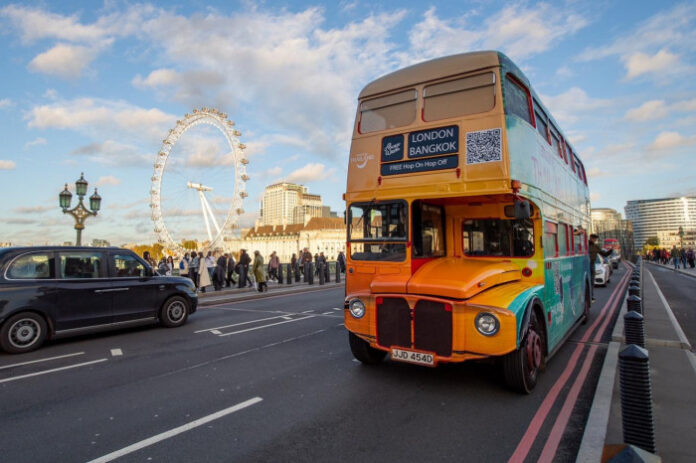The TAT organised a double-decker London bus wrapped in an ‘Always Warm’ decoration to offer hop on, hop off services on Nov 5-6 and Nov 9-12 from the London Eye, with stops at key attractions in the capital.
LONDON: The Tourism and Sports Ministry is planning to ask the cabinet this month for a budget of 8.7 billion baht to support the tourism industry, saying a “booster shot” is required for Thailand to attract 18-20 million tourists next year.
Of the total budget, 7.2 billion baht would be allocated for the fifth phase of the “Rao Tiew Duay Kan” (We Travel Together) campaign to promote domestic tourism, Tourism and Sports Minister Phiphat Ratchakitprakarn said on the sidelines of the World Travel Market held in London.
Another 1.5 billion baht is for the Tourism Authority of Thailand’s (TAT) marketing budget, comprising 1 billion for overseas activities and 500 million for the domestic market.
The TAT was assigned to wrap up details of the so-called “New Year Gift” package within two weeks for the proposal to be presented to the cabinet on Nov 28, he said.
“The TAT aims to attract at least 18 million visitors next year, but the government’s target is a minimum of 20 million. That is a conservative projection compared with the Bank of Thailand’s estimate of 25-28 million tourists,” said Mr Phiphat.
“However, to achieve 20 million visitors or 80% of the tourism revenue we tallied in 2019 is not an easy task next year amid the gloomy economic outlook. We have to ask for more budget as a booster shot is required to stimulate tourism, especially domestic travel.”
The ministry is also planning to seek the cabinet’s approval to waive the visa requirement for all European visitors and extend the stay for tourists from countries/territories entitled to visa exemption. At present, visitors from some European countries require a visa to come to Thailand.
Effective from Oct 1 this year to March 31, 2023, the period of stay is extended to 45 days from 30 days for tourists from countries/territories entitled to a visa exemption, and to 30 days from 15 days for those eligible for a visa on arrival.
Now fully reopened to foreign visitors, Thailand no longer requires tourists to show proof of vaccination or ATK test results.
TAT governor Yuthasak Supasorn said there are some concerns for the tourism industry this year and next, including limited airline capacity and the energy crisis in Europe, which is driven by the Russia-Ukraine war.
Meanwhile, China has maintained strict requirements for its nationals to travel abroad, though some positive signs have emerged lately, said Mr Yuthasak.
Starting with a cut in the quarantine period, Beijing is allowing more groups of Chinese people to go abroad, including students and people attending corporate meetings, he said.
The ministry and the TAT hope the mainland will further ease rules for visitors after Prime Minister Prayut Chan-o-cha holds talks with his Chinese counterpart Xi Jinping at the Asia-Pacific Economic Cooperation summit in Bangkok this week.
In 2019, 11 million Chinese tourists visited Thailand.
“Chinese tourists accounted for 27% of Thailand’s overall foreign visitor total in 2019. With that market gone, it is difficult for the industry to return to previous levels,” Mr Phiphat said.
“We are trying very hard and hoping China will reopen for tourism. After a discussion with the TAT, roughly 4 million Chinese visitors are expected to visit Thailand next year.”













